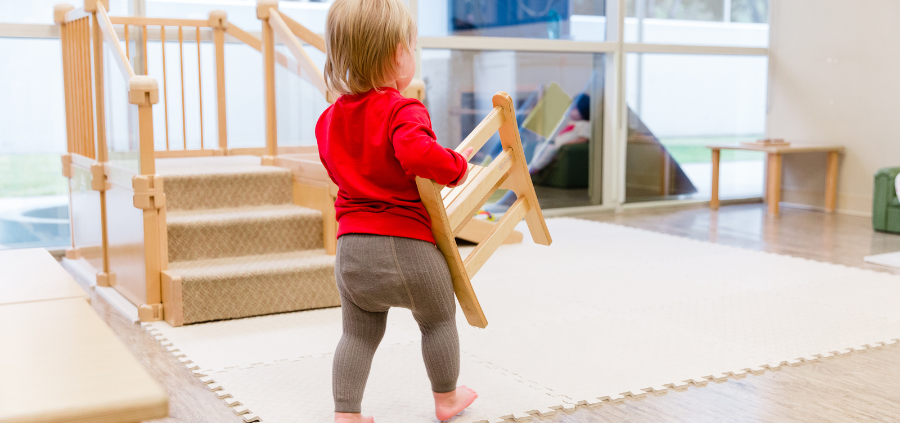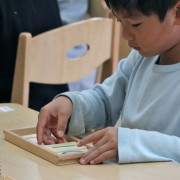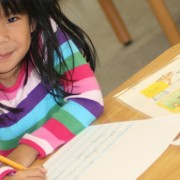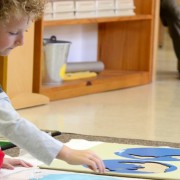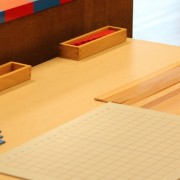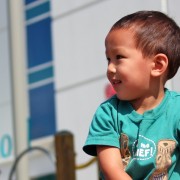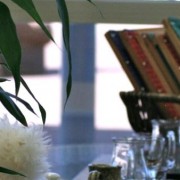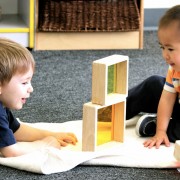What’s the big deal with independence in Montessori preschool?
Montessori preschool and toddler programs emphasize helping children become independent far more than traditional education approaches. Why is that?
According to Dr. Montessori, “If teaching is to be effective with young children, it must assist them to advance on the way to independence.”
Toddlers are naturally eager to learn how to accomplish new things. “Do it myself” might well be the motto for the toddler years! Enabling a toddler to become more independent has benefits, both now and in the long term.
So if independence is vitally important, how do we go about fostering it?
Let’s start by quoting some hard-hitting words from Dr. Montessori:
“We believe that children are like puppets. We wash them and feed them as if they were dolls. We never stop to think that a child who does not act does not know how to act, but he should act, and nature has given him all the means for learning how to act. Our primary duty toward him is to assist him to perform useful acts.” Dr. Maria Montessori
A goal in our classroom is to act as an educator, someone who guides your child toward independence. We do this, in part, by preparing the environment, teaching individual skills step-by-step, slowing down, and embracing error. By following those same concepts in your home, you can support your child as they gain independence.
For example:
Prepare the environment.
- Give your child access in the kitchen. Arrange plates and silverware for him on a low open shelf, or in a drawer. Provide a step stool so he can reach the counter to work with you, or place a small table and chair in the kitchen for him to work at.
- Organize the family room so he can participate. It’s best to offer low shelves with only a few toys out at a time and a place for each item. That way, he can put his things away, and find them, when he needs them.
- Set up his room and bathroom to support his growing independence in dressing and washing up. Look for a high step stool that will enable your child to access the sink. In his room, display a few (3-4 at most) sets of clothing on a low shelf or in shallow baskets. Make sure there is a clothes hamper for him to place dirty clothes in at the end of the day.

Teach individual skills, step-by-step. There are many tasks your child can accomplish on their own, if the time is taken to show them how.
- He can set his place at the table. You can make him a placemat with outlines of plate, spoon, fork and cup. Or you can show him one thing at a time.
- She can feed herself. Start with finger foods, then introduce spoon and fork. Allow ample time for your 2-year-old to feed herself—and resist the urge to take over!
- He can carry dirty dishes into the kitchen. An older toddler can scrape his plate into the trash can, and perhaps even place it in the dishwasher with some coaching.

Slow down. One of the benefits of the Montessori preschool and toddler environment is the abundance of time. We are careful to preserve an unhurried day for our students, so that we can go at a toddler’s pace. If weekdays are just too crazy (we understand!), then set aside an hour or two on the weekend. Spend time together in the kitchen, for example, to jointly prepare a meal.

Embrace error. When toddlers and preschoolers learn, it can get messy. Things can and will get broken; liquids will spill; food will land on the floor. In Montessori preschool, we view all of this as a natural part of learning, not as mistakes. Cleanup is therefore a part of every activity, not something separate from it. The common phrase regarding learning from one’s mistakes is well-known for a reason. We learn our lessons best through trial and error, and that is often accompanied by messes and broken pieces!
Independence is a big deal in Montessori preschool for many reasons. At a very fundamental level, though, the motivation for independence is clear. As Dr. Montessori says, “These words reveal the child’s inner needs: ‘Help me to do it alone.’”

